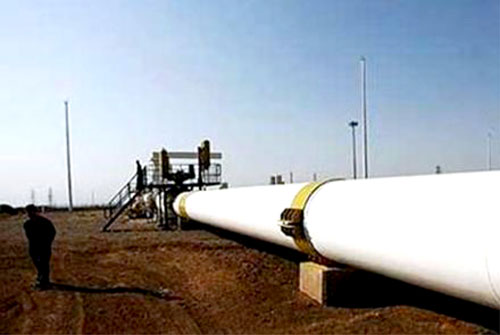The Islamic Emirate said it would soon resume the TAPI pipeline project, saying that the suspension of the Asian Development Bank’s (ADB) activities will not halt the project.
Earlier, a Pakistan news agency quoted a top Pakistani official of the Energy Ministry saying that the Asian Development Bank (ADB) has paused all due diligence and processing activities of TAPI pending the official recognition of the Islamic Emirate by the United Nations and major global economies.
The Ministry of Finance denied the report, saying that the ADB was active in a consultative capacity, and that the project is mainly being supported by Turkmenistan.
“The project is mainly owned by Turkmenistan and the ADB was (or is still?) playing a role as a financial advisor,” said Ahmad Wali Haqmal, a spokesman for the Ministry of Finance.
The Turkmenistan-Afghanistan-Pakistan and India (TAPI) gas pipeline is planned to span 1,680km and connect Herat and Kandahar in Afghanistan with Pakistan and India.
Afghanistan will pay five percent of the project’s expenses.
“This idea of the (ADB) is important for the implementation of the project but this project belongs to Turkmenistan,” said Abdul Rahman Habib, a spokesman for the Ministry of Economy.
Earlier the Islamic Emirate announced that it will resume the TAPI pipeline project in the coming spring.
Economists believe that political contests between India and Pakistan are the main reason for the suspension of the project.
“The government of the Taliban has yet to be recognized. This is a big problem, and, therefore, the ADB stopped funding the project. The Taliban government also doesn’t have the financial capacity to support the project,” said Meer Shikbi, an economist.
Meanwhile, officials at the Foreign Ministry said that they will soon sign the remaining seven agreements on the TAPI project with TAPI project partners.
Waliullah Shaheen, the director of strategic studies at the Ministry of Foreign Affairs, said that Turkmenistan will pay Afghanistan’s share for the TAPI project on loan.
“Regarding this issue, we have agreed with Turkmenistan that it will lend to Afghanistan the expenses to pay and Afghanistan will pay it back from the revenues of this project in the future,” said Waliullah Shaheen.
Based on data of the Foreign Ministry, there are sixteen documents for the implementation of the TAPI project, 9 of which were signed before the collapse of the previous government and seven of the remaining agreements will be signed soon.
Meanwhile, the Ministry of Finance says that in the new fiscal year, the budget for the TAPI project will be allocated.
“For the TAPI project and other development projects, in the year of 1401 the budget will be considered,” said Ahmad Wali Haqmal, spokesman of the Ministry of Finance.
In the meantime, some economists believe that Afghanistan cannot afford to contribute to the TAPI project.
“It seems that the Islamic Emirate alone will not be able to launch the TAPI project or even to start its initial work, as the sanctions imposed and the foreign aid from the world has stopped,” said Sayed Nasir Reshtia, economist.
The TAPI project will cost between $9 billion to $10 billion, and the parties involved in the project and the responsibility for the construction and management of this large regional project is under an entity known as TAPI Pipeline Company Limited (TPCL).—Tolonews










